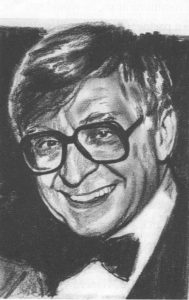What communicators know, and what they must teach
What I learned from Larry Ragan and a thousand other communicators is what I hope to teach the world.

I have a new book out today, called “An Effort to Understand: Hearing One Another (and Ourselves) in a Nation Cracked in Half.”
When it became available for pre-order a year and a half ago, the topic was topical and relevant: communication lessons for tense times.
By now, people are talking about the book as if it’s an emergency manual, an American Hail Mary, an instant antivenom cure. As you know and I know, communication can be no such thing. But as we also know, communication is the only way to begin.
And as I think about how to begin, I find myself thinking about the beginning of my life as a communicator, almost 30 years ago—my first job out of college, at a little trade PR publisher called Ragan Communications.
And Ragan was little back then—about a dozen people. As an editorial assistant, I was frequently pulled off a writing assignment and sent down in the freight elevator to the basement storage pen to retrieve a booklet for a customer who had called. (Sometimes, while I was down there, I had a smoke.) When my yellowed Macintosh came up x-eyes, there was no IT guy; I simply unplugged the machine and lugged it a few blocks to the repair shop. The company put on a conference for speechwriters at a big hotel; I worked the cloak room.
The founder, Larry Ragan, wrote about his own first writing job, just after the war: answering customer complaints, for a company that sold false teeth by mail. I could relate to that.

Lawrence Ragan
But I learned things from Larry—who had learned them from his own life surrounded by communicators—that formed much of the basis for this book that I’ve written, that I hope has something important to say today.
From Larry—and from a thousand other communicators I’ve known over three decades in this business—I learned what a communicator knows:
- A communicator knows that words are not communication—rather, they are usually mere captions for our actions. After Watergate, Larry rejected some observers’ belief that the Nixon White House had been poorly served by their public relations advisors. He said Nixon and his men were victims of their own actions, that couldn’t be papered over. In a style that sounded like the Royal manual typewriter it was written on, Larry concluded: “Boys, you weren’t good. Bad PR.”
- A communicator knows that communication doesn’t simply mean persuading other people to our point of view. Communication means expressing our point of view the best way we know how—after listening to the other idea as carefully as we can. And then giving the other person at least one more chance to respond without needing to have the last word. “We’ve had our say,” Larry used to say, admonishing his editors not to write italicized retorts to letters to the editor, “Let the readers have theirs.”
- A communicator often helps in humble, unseen ways: By quietly suggesting that an insensitive thing not be said. By judiciously sharing with the CEO something that a lowly mailroom employee said that’s undeniably true. By writing a thing more clearly if it needs it, and more decorously if it needs that. To indicate that he wasn’t serving lunch on the second day of the conference, Larry wrote on the agenda, “Enjoy lunch on your own.”
- A communicator knows that there has never been a universally shared truth. Recalling a time when there was one is a nostalgic dream, and imagining a future when there’ll be one is a mirage. And ours isn’t the first disquieting disconnect: I remember a lunch table conversation about the O.J. Simpson trial, Larry expressing his alarm about the conflicting versions of the truth surrounding the crime. “Sort of makes a mockery of reality,” he grumbled. Yet Larry frequently described the work of communicators with a phrase, “as we grope toward the truth,” that acknowledged the elusiveness of same. And the endless effort, anyway.
- And a communicator knows the limitations of communication. Larry Ragan gently mocked communicators who naively believed every social problem was something be talked through, with a win-win solution always awaiting discovery. He knew some problems had to be worked out, through politics, power and policy change. But of course those processes themselves rely on clear, thoughtful, sensitive communication. So a wise communicator would always be essential to have around.
Now more than ever.
In fact, in what seems like a kind of civic emergency in America, we can’t rely on professional communicators alone. We need amateurs to know what we know—young people and old, liberal and conservative, citizens of every stripe and in every corner of our life—and that’s what this book sets out to do:
To share our wisdom with everyone, so we can all make an honest “effort to understand”—together.
I truly hope it helps.
David Murray heads the global Professional Speechwriters Association and writes the popular blog Writing Boots. His latest book, “An Effort to Understand: Hearing One Another (And Ourselves) In a Nation Cracked in Half” will be published by Disruption Books on March 3, 2021.






